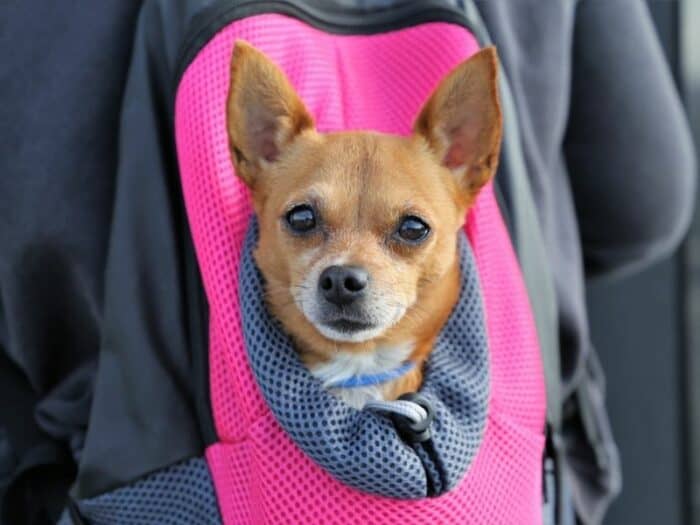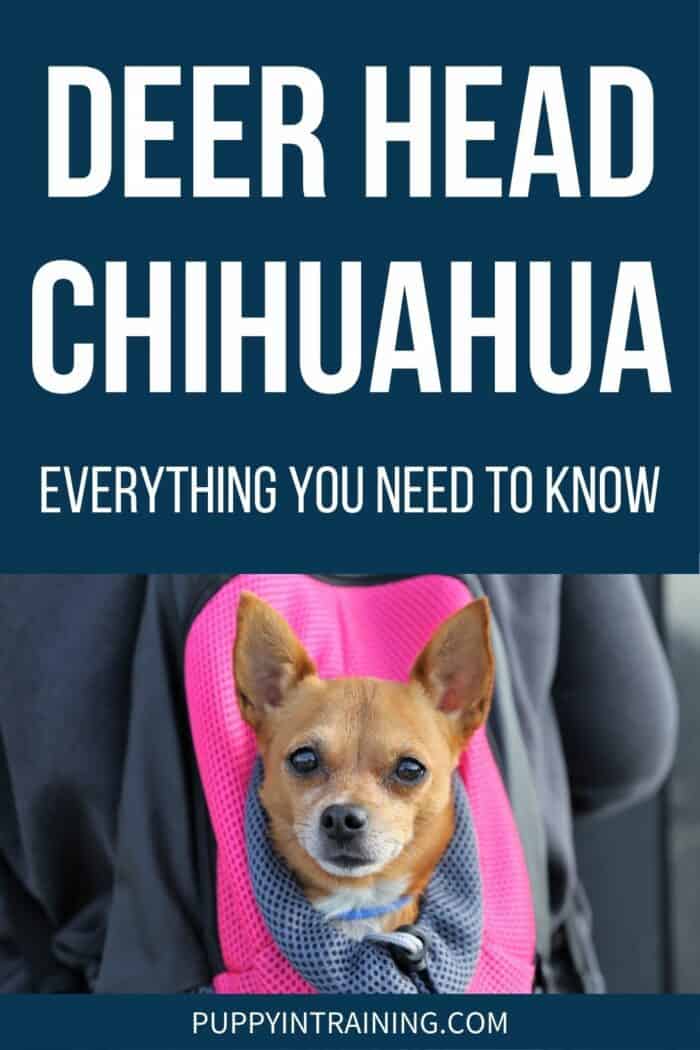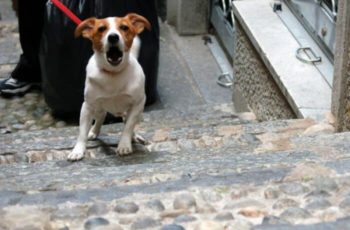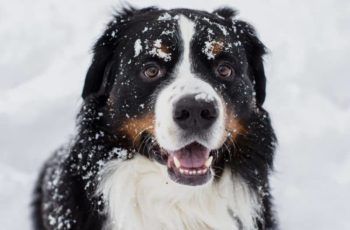This post may contain affiliate links. We may earn money or products from the companies mentioned in this post.
If you are thinking of adopting a Chihuahua, you will need to choose between adopting a Deer Head or an Apple Head Chihuahua.
While the two dogs are variations within the same breed and have a very similar temperament, they can actually look quite different. Which look you prefer depends on you.
If you love the idea of a Chihuahua but you worry about their infamous aggressive nature, you may want to consider a Deer Head.
Anecdotal evidence from people who have owned various Chihuahuas suggests that the Deer Head variety tends to be less aggressive. They are also taller and a bit less fragile than their Apple Head cousins.

However, it is also worth bearing in mind that it is the Apple Head Chihuahua that dictates the breed standard. This means that if you have a Deer Head Chihuahua, you won’t be able to enter them in confirmation shows.
However, most people thinking of adopting a Chihuahua are looking for a small companion dog to love that won’t mind living in a relatively small space and that you can take with you most places.
If that is what you are looking for, keep reading for everything you need to know about the Deer Head Chihuahua.
Vital Statistics
- 7-10 pounds
- 8-12 inches tall
- 14-16 years life expectancy
- Toy group
- Companion
History Of The Breed
As well as being the smallest dog breed recognized by many kennel clubs, the Chihuahua has a long and interesting history. There is evidence of relatives of the Chihuahua kept as companion dogs by the Aztecs in the 1500s.
It is claimed that the Conquistadors named an area of Mexico Chihuahua because so many of the dogs could be found there.
The modern Chihuahua was bred in the United States and only registered with the American Kennel Club in 1904.
There are still wild packs of Chihuahuas roaming the Arizona desert. Considering how outspoken these little dogs are, that’s actually quite a scary thought!
Deer Head vs. Apple Head Chihuahua
As we have already said, there are two variations within the Chihuahua breed: Apple Head and Deer Head.
We list Apple Head first because this is the variation that dictates the breed standard. This also means that only Apple Head Chihuahuas can compete in conformation shows.
The main difference between the two dogs is the formation of the skull. The Apple Head skull is more or less the shape of an apple. The stop, the slope between the muzzle and the forehead, is steep with about a 90-degree angle.
The head of a Deer Head Chihuahua looks more like a deer with a long muzzle and a slightly sloped stop around 45 degrees. Apple Heads also tend to have a shorter jawline.
The two variations are also a bit different in size. The Apple Head tends to have shorter legs and neck, so Deer Head Chihuahuas tend to be taller and often weigh more.
Nevertheless, all Chihuahuas are small and tend to suffer from Small Dog Syndrome. But there is anecdotal evidence that the Deer Head Chihuahua is the less aggressive of the two.
The Deer Head is often called the “older” version of the breed, which is why it is secondary to the Apple Head in the breed definition.
However, there is evidence that both variations existed in Central America in the pre-colonial period, so they both have a long history.
Appearance
While all Chihuahuas are small dogs of the toy size, Deer Head Chihuahuas tend to have longer legs and necks, so they can be a bit bigger than other Chihuahuas.
They tend to be between 8-12 inches tall and weigh 7-10 pounds, but smaller versions of the pup are also known.
As well as their deer-shaped head, they have ears that stand upright and full round eyes that should be dark brown in color.
Their neck should be slightly arched, sloping down to lean shoulders, a long back, and a long tail that stays upright. While a scared Chihuahua might put their tail between their legs in fear, their tail should never hang down.
They can come in a wide variety of colors. The most common colors for Chihuahuas, in general, are fawn, chocolate, or liver.
Deer Head Chihuahuas will often appear in silver, grey, black, or white. Merles and other patterned variations are more common in Apple Head Chihuahuas.
Chihuahuas can have either short or long hair. Both shed moderately, though it is more noticeable with a long-haired Chihuahua.
Temperament
Chihuahuas are generally known for being small dogs with big personalities. They tend to have Small Dog Syndrome, or Napoleon Syndrome, which means that they have to bark a lot and behave territorially to make up for their size.
Chihuahuas make great guard dogs as they will warn you any time someone they don’t know arrives on your property (and probably if it is someone they do know as well).
While this can be a great doorbell, it can be a problem if you live in an apartment with lots of people passing.
Chihuahuas were bred as companion dogs, so they love being around people. They can easily develop depression or separation anxiety if they are left at home alone for long periods on a regular basis.
They will tend to bond with one member of the family as their principal person. While they will develop close bonds with other people they have close contact with, their main loyalty will be to this individual.
It will be the person who spends the most time with them (and not necessarily the person who feeds them).
While their small size means that first-time owners can usually handle a Chihuahua, their strong personality means that they need a strong hand. They tend to thrive with someone who is experienced and confident with canines.
Since Chihuahuas tend to be territorial and possessive, they don’t necessarily get on well with other animals.
However, if they are probably socialized, this can be overcome. They can be trained to get along with cats, and their main problem with larger dogs is that they try to keep up and wear themselves out or get hurt in the process. They do love other Chihuahuas.
They can have a tendency to bark at and even nip strangers who get too close or children who play rough. They don’t tend to do well in houses with small children because they are relatively fragile and can’t handle unintentional rough play.
These dogs tend to be happy pottering around the house and love to curl up with you. This does mean that you should always check before sitting down as they are often curled up under a blanket somewhere — they don’t like the cold.
When they have the energy to burn, they will generally create their own fun. Their small size means that they don’t do much damage, but they can be in the habit of doing things such as stealing socks, so best to keep these out of reach.
The size of these dogs means that they travel well, and they generally remain calm when they are out and about as long as their people are close.
But you do have to watch out. They will probably consider your car their territory and are likely to jump up at and bark at anyone who approaches the car.
Care
Chihuahuas need lots of love and attention, and they need lots of companionships. They aren’t the type of dog that you can leave at home for hours on end. They do best in situations where there is generally someone home or they can accompany someone to work.
They can also be challenging to train. This is not because they lack the intelligence to learn, but rather because they are stubborn and have strong personalities. Housetraining and teaching them not to bark at everything is incredibly difficult.
Read our guide to training puppies here.
Outside of these challenges, Chihuahuas are pretty low-maintenance dogs. They don’t need much exercise. You should take them out for a 15-20 minute walk every day.
But this is more about the stimulation of the sights and smells than the exercise. Outside of this, their playful nature means that they will wear themselves out naturally during the day.
Their small size means that they also don’t need much to eat. Most Chihuahuas shouldn’t need more than 400 calories a day. However, it is important to choose foods high in protein and essential nutrients.
Since they aren’t eating much, they must get everything they need from the small amount that they eat.
Of course, they think that they are people, and they will want whatever is on your plate. You should resist giving them food off your plate or they will start expecting food at every meal.
Grooming is also pretty easy. If they have short hair, they only need to be brushed once a week. If they have long hair, it should be three times a week.
Since they are mostly indoor dogs, they don’t need to be bathed too often. Once a month is usually sufficient.
Regular tooth cleaning is a must as they tend to be prone to dental issues. They do better with a doggy toothbrush than dental chews.
You can read more about canine dental health here.
Health Concerns
Like most small dogs, Chihuahuas have a healthy lifespan of 14-16 years, though many have been known to live for more than 20 years. They are predisposed to a number of serious health problems.
They can be predisposed to develop neurological diseases such as atlantoaxial instability, ceroid lipofuscinosis, congenital deafness, congenital hydrocephalus, muscular dystrophy, necrotizing meningoencephalitis, and neuraxial dystrophy.
Many Chihuahuas are also born with molera, which is a soft area of the skull.
This is more common in Apple Head Chihuahuas, and in all variations, it usually closes within the first three to four months. But it is important to protect their skulls during this formative period.
It is also common for Chihuahuas to have patella luxation, which is when the knee cap regularly pops out of place. It is also not uncommon for them to develop cardiovascular issues.
Cost Of A Deer Head Chihuahua
Chihuahuas are very popular dogs, so there are many breeders. You can find puppies for as little as $400, but they can cost up to $1,500.
If you are specifically looking for a Deer Head Chihuahua, you will need to shop around for a breeder that specializes in the variation.
Should I Adopt A Deer Head Chihuahua?
Are you considering adopting a Deer Head Chihuahua? Ask yourself the following questions to decide whether it is a good fit.
What Is My Living Situation?
Fortunately, Chihuahuas tend to do well in apartments, so you can have a Chihuahua in pretty much any type of housing. You may want to do a little bit of puppy proofing to save socks and other small items from these playful pooches.
How Much Time Do I Have For A Dog?
Chihuahuas were bred to be companions for humans, and they need human companionship. They can’t be left alone at home for extended periods on a regular basis because they will develop separation anxiety.
They do best in houses where there is always someone around or when they can accompany someone to work.
Do I Have Experience With Dogs?
Many people assume that a small breed will be easier for first-time owners than larger dogs. But Chihuahuas are a handful.
They are hard to train, and they can become over-protective and reactive. They do best with someone who knows what they are doing, rather than someone that they can easily win over with their “puppy dog eyes.”
Do You Have Small Children Or Other Pets?
Chihuahuas don’t tend to mix well with small children as they can be easily hurt by overenthusiastic hands. They can also struggle to bond with other animals.
If you get a Chihuahua as a puppy, you can probably socialize them to get on with other pets. But it can be hard to introduce an adult Chihuahua to existing pets or to introduce a new pet into a Chihuahua-dominated household.
FAQs
Are Deer Head Chihuahuas rare?
Deer Head Chihuahuas are not rare, but their head shape is outside of the breed guidelines. Since the breed guides are based on the Apple Head Chihuahua’s appearance, most of the Chihuahuas you see are likely to be an Apple Head.
Why do some Chihuahuas have deer heads?
Some experts suggest that the Techichi, which has an apple head, is the true ancestor of Chihuahuas. They then suggest that the Deer Head variation was the result of breeding with Chinese Crested Dogs. But both variations have been around for centuries.
How fast can a Deer Head Chihuahua run?
With their longer legs, Deer Head Chihuahuas can run relatively fast for a small dog. They can typically run at about 15 kilometers per hour for short bursts. For reference, humans can run at about 27 miles per hour.
Are Chihuahuas smart?
Chihuahuas are not considered among the most intelligent breeds because they lack obedience and the ability to be trained as working dogs. But they are highly adaptable and they are good at figuring out what is wanted from them in most situations.
Are Chihuahuas clingy?
Chihuahuas are notoriously needy dogs that crave love and attention. They enjoy hugs and cuddles, and they are also eager to please.
Can Chihuahuas bite your finger off?
While Chihuahuas have sharp little teeth, they also have a pretty strong bite force of around 3,900 psi per square inch. This means they could technically take a finger off, so you can admit their restraint when they give you a nip.
Should Chihuahuas sleep with you?
While your Chihuahua will love to sleep with you and it is not bad for them in theory, there are some health concerns about sharing your bed with a Chihuahua.
There are concerns about disease transmissions from human to dog and vice versa when it comes to sharing a bed, though it is relatively rare.
The Verdict
If you are looking for an energetic little dog to join your household, a Chihuahua is always a great choice. Whether you choose a Deer Head or an Apple Head dog, they make loyal and loving companions.
However, anecdotal evidence suggests that Deer Head Chihuahuas are a little less aggressive and territorial.
While Chihuahuas are low maintenance in terms of exercise and grooming, this doesn’t mean that they are easy to look after.
They are demanding of love and attention and they have sassy personalities. But the bond you can form with one of these dogs is certainly worth the work.
Do you have experience with Chihuahuas?
Do you think Deer Head Chihuahuas are less aggressive?
Share your thoughts with the community in the comments section below.
Save To Pinterest

Top Picks For Our Puppies
- BEST PUPPY TOY
We Like: Snuggle Puppy w/ Heart Beat & Heat Pack – Perfect for new puppies. We get all of our Service Dog pups a Snuggle Puppy. - BEST DOG CHEW
We Like: Best Bully Sticks – All of our puppies love to bite, nip, and chew. We love using Bully Sticks to help divert these unwanted behaviors. - BEST DOG TREATS
We Like: Wellness Soft Puppy Bites – One of our favorite treats for training our service dog puppies. - BEST FRESH DOG FOOD
We Like: The Farmer’s Dog – A couple months ago we started feeding Raven fresh dog food and she loves it! Get 50% off your first order of The Farmer’s Dog.
Check out more of our favorites on our New Puppy Checklist.


